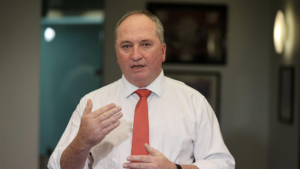Home » Commentary » Opinion » Climate retreat may be one too many for the Nats
· The Australian
 During the past few weeks, the federal Nationals made headlines when they raised concerns about Scott Morrison’s climate change polices, and his decision to sign up to a 2050 carbon-emissions goal at the Glasgow COP26 climate summit this week.
During the past few weeks, the federal Nationals made headlines when they raised concerns about Scott Morrison’s climate change polices, and his decision to sign up to a 2050 carbon-emissions goal at the Glasgow COP26 climate summit this week.
Under their revived leader, Barnaby Joyce, the Nationals gave the definite impression that their motives were genuine. That this was not just another Nationals ambit claim for the political gain of extra benefits that have long characterised their coalition with the Liberals – which many have seen as nothing more than a “marriage of convenience”.
If the Nationals really were pursuing a stance based on wider public interest principles, it would have given them some distinction in our poll-driven political arena. It would also have given them a point of difference compared with the Liberal Party, which many consider has abandoned its base of outer suburbia, small business and the economic principles of fiscal frugality. There was a glimmer of hope that the Nationals might – just might – fill the void the Liberals have left behind.
But in the end, the Nationals did a deal and signed on to Morrison’s climate change agenda.
This is not surprising. What is surprising is that they sold out for so little.
A promise of a regular Productivity Commission review of the impact of climate change policies on the regions is hardly a big win. After all, what chance do commission recommendations ever have of being implemented?
There were also some other concessions for the farming sector and the regions. These might not be as tokenistic as they appear; but even if substantive, they will take years to implement and produce any positive policy and political benefits.
And an extra Nationals position in cabinet for a person and portfolio who was previously a member is hardly a big gain. What’s worse is it simply looks craven.
Overall, the events of recent weeks have exposed more of the Nationals’ weaknesses than their strengths. They have revealed division in federal Nationals ranks and the tenuous hold Joyce has on the leadership. Politically, it looked like a backdown – the party overpromised and under-delivered. Their “retail” politician Joyce failed to market and sell their views. Further, the events highlighted their limited political clout, given that the concessions gained seem so meagre.
Moreover, given the G20 meeting and the watering down of emission commitments, little is really coming out of the Glasgow COP26 summit.
The Nationals threw in the towel too quickly and could have had more influence had they stayed the course.
None of this will make it any easier for the Nationals to repel the independents and other parties nibbling at their homeland seats, or mitigate their growing reputation as just another bunch of politicians desperate to cling to office at any price.
Indeed, they look increasingly less like a political party and more and more as just another pressure group appended to the Liberals who are seeking to gain concessions, subsidies and positions.
As the Prime Minister is in Scotland for the Glasgow summit, all might ponder the fate of Bonnie Prince Charlie’s last desperate bid in that far land to regain the British crown for the Stuart cause at the 1745 rebellion. Charlie and his army got as far south as Derby in England; just a few days’ march from London. They then retreated and retreated until, plagued by desertions and indecisive leadership, they were cornered and defeated at Culloden. It was the end of the Stuart cause forever.
The demise of the Nationals has long been predicted. They have defied the odds for a long time. But this time, the Nationals may have done one backroom deal too many, and – by retreating once again – exposed their opportunism and misjudgment so much that their long-term survival is not sustainable.
Climate retreat may be one too many for the Nats